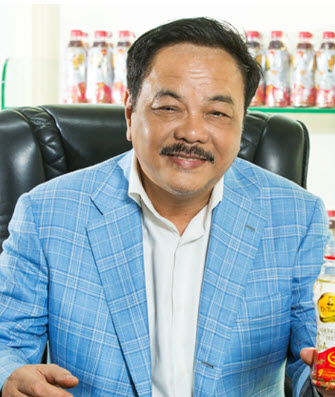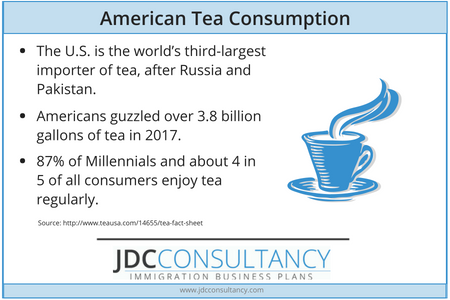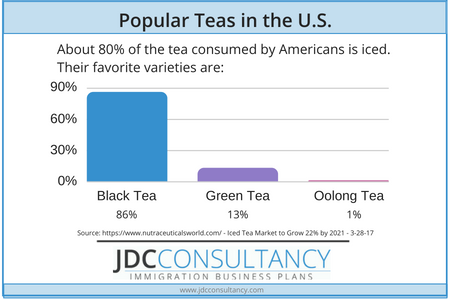In 2018, the United States is primed to receive the most innovative, future-focused businesses led by charismatic, intelligent businesspeople from all backgrounds. Soon, this could include the prestigious Mr. Tran Qui Thanh, a Vietnamese serial-entrepreneur who is known in his home country as the “King of Tea.” Mr. Tran is one of Vietnam’s most impressive entrepreneurs. A recent article from the BBC, “The tea boss with a thirst for global domination,” tells the story of how his soft drinks firm, Tan Hiep Phat Beverage Group (“THP”), which was formed in 1994, has exploded into an international phenomenon.
 The company, which reported sales of $500m in 2015 is now Vietnam’s largest privately owned soft drinks firm. Its output is impressive, at over one billion liters of bottled herbal teas, green tea, soya milk, water, and energy drinks each year. Mr. Than was inspired to create his own beverage company after attending the annual Drinktec drinks industry trade fair in Germany. The company began with only 20 employees and an output of just one million liters per year, and its growth shows no signs of stopping. By 2023, Mr. Tran expects that his company will produce over 3 billion liters of beverages each year. THP now employs over 4,000 workers, outstripping beverage behemoth Coca-Cola in the region, which has only 2,000 Vietnamese employees. With this in mind, THP is the soft drinks company to watch in coming years.
The company, which reported sales of $500m in 2015 is now Vietnam’s largest privately owned soft drinks firm. Its output is impressive, at over one billion liters of bottled herbal teas, green tea, soya milk, water, and energy drinks each year. Mr. Than was inspired to create his own beverage company after attending the annual Drinktec drinks industry trade fair in Germany. The company began with only 20 employees and an output of just one million liters per year, and its growth shows no signs of stopping. By 2023, Mr. Tran expects that his company will produce over 3 billion liters of beverages each year. THP now employs over 4,000 workers, outstripping beverage behemoth Coca-Cola in the region, which has only 2,000 Vietnamese employees. With this in mind, THP is the soft drinks company to watch in coming years.
An Independent Success
Mr. Tran and THP operate with an eye on the future and a tenacious desire to expand until THP is a household name around the globe. It is a fiercely independent business that knows its own value and dreams big. In 2011, when Coca-Cola offered to buy THP after it valued the company at $2.5 billion, THP refused because Coca-Cola planned to limit its operations to Vietnam, which would have prevented Mr. Tran’s dream of truly global notoriety from coming true. The company is now well on its way to achieving this dream, as it has already expanded into 16 countries outside of Vietnam. Despite this international presence, only 10% of its sales are from exports; a statistic that Mr. Tran expects to change soon. He has his eye on the United States market and plans to expand into this massive new market as soon as possible. To achieve this and become an immigrant entrepreneur to the United States, Mr. Tran would be required to obtain an appropriate visa.
“Always fighting”
Like many immigrant entrepreneurs, Mr. Tran comes from humble circumstances that would have discouraged a less determined person. He grew up amidst the conflict of the Vietnam war and was orphaned at age 9 when his mother was killed in a car crash. From childhood, he struggled to make a name for himself against all the odds. When remembering his past, he said, “Always attack, always fighting, because we have been fighting for so many years… so fighting is the way to win.” New challenges do not intimidate him, because he has faced worse odds before.
Mr. Tran’s first breakthrough came when, at age 23, he graduated from university in Ho Chi Minh City and started his first business while under restrictive communist sanctions. This business exposed Mr. Tran’s ingenuity and creativity, as he produced and sold yeast for making bread using hammocks left behind by U.S. soldiers to filter ingredients. While the communist government was discouraging entrepreneurship, he was determined to make a living, and when yeast was no longer viable, he switched to sugar, which was more in-demand.
“The state did not encourage private enterprises then,” he says. “We had no equipment, limited technical knowledge, and almost no capital. It was difficult…But goods were extremely scarce, so whatever you made could be sold, that was a good thing for us,” Mr. Tran said in his interview with the BBC.
Even in an environment that actively discouraged his efforts, Mr. Tran persisted, and when the communist government began to encourage entrepreneurship in the 1980’s, he hit the ground running and began laying the foundation for his tea empire. Despite its size, Tan Hiep Phat Beverage Group is a family business, with his two daughters, Tran Uyen Phuong and Tran Ngoc Bich, are in charge of public relations and personnel.
Of her father, Tran Ngoc Bich says: “My father has a motto which is now the company motto – today is better than yesterday, but not as good as tomorrow. He is always looking ahead to the next step.” For THP, the next step could be an expansion to the United States, which is a growing market for tea.
Billions of Gallons, One Sip at a Time
Demand for tea is booming in the United States. Next to water, it is the world’s second most popular beverage and can be found in over 80% of U.S. homes. Americans are increasingly recognizing the health benefits of tea and are appreciating the variety of flavors and options more than ever before.
 Ready-to-drink (RTD) iced teas, like those brewed by THP, are becoming more popular, and in 2017, about 1.8 billion gallons of this type of tea was sold in the U.S. RTD tea in canned and bottled form comprised just under 50% of the overall market and is expected to grow an estimated 30-35% over the five-year period from 2017-2022. This is a healthy compound annual growth rate (CAGR) of 4-6% and opens up new opportunities for Mr. Tran’s products. According to Zenith Global, the global consumption of iced tea is expected to increase to 45 billion liters by 2021, exceeding the average for soft drinks.
Ready-to-drink (RTD) iced teas, like those brewed by THP, are becoming more popular, and in 2017, about 1.8 billion gallons of this type of tea was sold in the U.S. RTD tea in canned and bottled form comprised just under 50% of the overall market and is expected to grow an estimated 30-35% over the five-year period from 2017-2022. This is a healthy compound annual growth rate (CAGR) of 4-6% and opens up new opportunities for Mr. Tran’s products. According to Zenith Global, the global consumption of iced tea is expected to increase to 45 billion liters by 2021, exceeding the average for soft drinks.
“Tea is renowned for being healthy and refreshing. Ready-to-drink iced tea delivers added variety and convenience,” Zenith Chairman Richard Hall said. Iced tea offers flavor opportunities that hot tea does not, and in North America and Europe, which comprise 24% of the global market, variety is the key to attracting and keeping an audience. As a company that is constantly evolving with new technologies and trends, THP will embrace any changes necessary to gain loyal consumers if it decides to expand to the United States.
A Potential Jobs Powerhouse
One of the most important aspects of becoming a foreign entrepreneur in the United States is job creation. Depending on the extent of the business that Mr. Tran would conduct in the U.S., he would need to hire anywhere from office staff to a full staff of production and distribution workers. The Vietnam team has over 4,000 workers, and if the company decides to operate on a similar scale in the United States, it could lead to the creation of thousands of U.S. jobs. Not only would this be excellent for the U.S. economy; it is one of the most important prerequisites for obtaining a business immigration visa such as an L-1 visa or EB-5 visa.
Visa Options: How THP May Enter the U.S. Market
As a foreign entrepreneur, if Mr. Tran or his management team decided they needed to spend an extended period in the U.S. to establish and expand his U.S. company, they would be required to obtain an immigration visa to develop and direct the activities of THP in the United States. As a business with substantial revenue, and the fact that Mr. Tran is an executive, there are a few options available to him and others that hold senior positions within the company.
 Depending on his circumstances at the time of his application, Mr. Tran (or members of his managerial team) may qualify for an L-1A Intracompany Transferee Visa which is a visa classification that enables a U.S. employer to transfer an executive or manager from one of its affiliated foreign offices to one of its offices in the United States. This classification also enables a foreign company which does not yet have an affiliated U.S. office to send an executive or manager to the United States with the purpose of establishing one.
Depending on his circumstances at the time of his application, Mr. Tran (or members of his managerial team) may qualify for an L-1A Intracompany Transferee Visa which is a visa classification that enables a U.S. employer to transfer an executive or manager from one of its affiliated foreign offices to one of its offices in the United States. This classification also enables a foreign company which does not yet have an affiliated U.S. office to send an executive or manager to the United States with the purpose of establishing one.
Unfortunately, for Mr. Tran, the E-2 Treaty Investor Visa and the E-1 Treaty Trader Visa are not available for nationals of Vietnam. A Treaty is an agreement between countries to promote positive relations, trade, and economic growth. While many countries are on the list and have treaties with the U.S. dating back decades, Vietnam is not.
EB-5 direct investment program.
For a multi-million-dollar company like THP, various options exist to expand the business to the United States. When an entrepreneur like Mr. Tran, who has decades of results to back his future plans, considers doing business in the United States, potentially creating a huge number of jobs, building up local economies, and introducing his fantastic products to this massive market, it presents a mutually-beneficial opportunity that should not be overlooked. The United States would be fortunate to welcome Mr. Tran and THP, both because of who he is as an individual and his tremendous ability to succeed in any environment. Likewise, the opportunities that the United States can offer a foreign entrepreneur like Mr. Tran are virtually endless.
You Might Be Interested in other U.S. Immigrant Success Stories!
Please take a look at the following awesome stories:
- A British Entrepreneur’s Sticky Toffee Pudding Success in the U.S.
- A U.S. Immigrant Family’s Global Pita Business
- See How Hospital Curtains are Empowering Immigrants in Miami – Susana’s Stitches
- Hugely Successful U.S. Immigrants That are Fortune 500 Job Creators
- Discover How Two Indian Immigrants are Setting the Trend for Fashion with a Conscience – The Sanaya Set
- A Massively Successful Immigrant Entrepreneur & DACA Recipient Helping Others Achieve Their Financial Dreams
- Learn How an Israeli Immigrant Couple’s Home Improvement Platform Has Revolutionized an Industry

